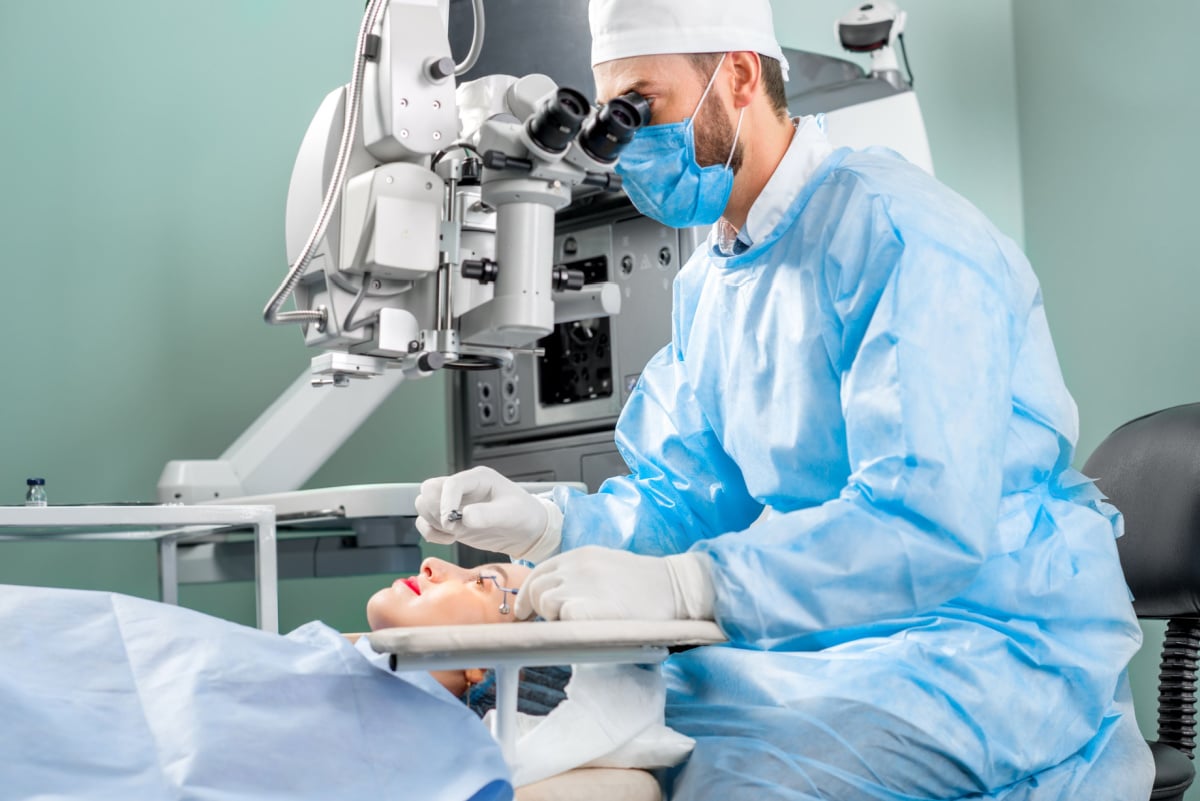Refractive lens exchange surgery, also known as RLE or Lens Replacement Surgery, is a refractive surgery that’s a non-laser alternative to LASIK and offers a way of upgrading your vision and reducing your need for glasses, particularly for reading.
The RLE procedure is similar to cataract surgery, but you don’t need cataracts to have it.
As background, a cataract is when the usually transparent lens inside your eye becomes cloudy. Cataracts develop in almost everyone with age, with around 70% of people suffering by age 85. Surgical removal plus implanting a basic artificial intraocular lens (IOL) will cure the condition.
Instead of waiting for cataracts, patients can opt for RLE to treat their need for reading glasses (presbyopia) in middle age.
Laser vision can achieve the same results using blended vision, but a patient may not be suitable. In addition, RLE offers a permanent correction and removes the need for cataract surgery in later life.
If you’re considering RLE, you probably want to know if it’s worth it and how long it will last.
Reflective Lens Exchange (RLE) is a 15-minute surgical procedure. RLE should last the patient’s entire life, assuming no secondary issues exist. Most patients will be free from glasses, but having RLE does not guarantee patients will never need glasses or other corrective eyewear.
How Long Does The RLE Procedure Take?
The Reflective Lens Exchange (RLE) procedure is swift and is done in an outpatient environment by an ophthalmologist. The entire process lasts less than an hour.
The ophthalmologist will measure your eye with ultrasound during your assessment consultation to measure its shape and size. They will need to determine the size of your natural crystalline lens, which needs to be removed, and see how light is focused onto your retina. The painless ultrasound will help the doctor determine the power of an intraocular lens (IOL) you need.
A variety of IOLs exist, and they can offer different features. For example, they can be silicone or acrylic and have differing optical benefits. Your ophthalmologist will recommend the best one based on your budget, needs, and lifestyle.
Before the procedure, your ophthalmologist dilates your affected eye/s. If necessary, you might be given a mild sedative to help you relax during the treatment. You will also receive a local anaesthetic to dull the nerves around your eye.
Once your eyes are numb, the surgeon will begin the procedure, removing your existing lens from your eye and replacing it with an artificial lens.
Not Sure Which Treatment Is Right For You?
We offer a number of vision correction treatments at our London Clinic.
We can give you a good idea of your suitability over the phone and schedule you for an initial consultation.
How Long Is RLE Effective?
Like most eye surgeries, Refractive Lens Exchange surgery is meant to last your entire life.
It usually takes a few days to recover before your vision clears, and that is without needing excessive post-surgery treatment.
You may need to use eye drops or wear an eye patch while your eye adjusts to the new lens, but you should recover fully within eight weeks.
Will I Need To Wear Glasses Or Contact Lenses After RLE?
Lens replacement surgery reduces a person’s dependence on corrective lenses, although it won’t prevent them from needing glasses in the future.
Millions of patients with RLE have enjoyed 20/20 vision after the procedure.
Your need for glasses will depend on personal factors and the type of lens you received during the procedure. Overall, with a premium multifocal lens, between 80-93% of patients are independent of glasses.
Will I Need Cataract Surgery After RLE?
No. Refractive Lens Exchange surgery is meant to last a person’s whole life, but there are a few instances where vision can change.
The most common consequence RLE patients face is that they may develop posterior capsule opacification (PCO). PCO is when some opacification develops behind the implanted lens and impairs your vision.
PCO is a normal part of healing and is not a complication. PCO develops in up to 20% of procedures.
If PCO occurs, the patient will require a short, painless procedure (about 5 minutes) to correct the problem. The treatment, called yttrium-aluminium-garnet (YAG) laser capsulotomy, is done in an outpatient setting.
Less common risks following lens replacement surgery include long-term postoperative complications, such as retinal detachment and cystoid macular oedema, which require further, more intensive treatment.
Who Can Have Refractive Lens Exchange Surgery?
Most RLE patients are over 45 and now require glasses for reading, or have significant long-sightedness.
Your eyes must be healthy and have no history of eye disease or recent vision instability. Candidates typically already experience presbyopia. If any cataract is present, the surgeon will remove it during the procedure.
Given that it’s more invasive than other eye surgeries, some people should not have lens replacement surgery, e.g. those with fewer cells on the back of the cornea, which will be assessed at your consultation.
As with all medical procedures, your ophthalmologist should ask you for your and your family’s medical history. This information can help you decide if you are a good candidate for RLE.
Conclusion
Refractive lens exchange surgery takes 15-20 minutes to perform, and the recovery period takes a few days, during which you may need to use eye drops or wear an eye patch while your eye adjusts to the new lens.
The results are usually long-lasting, although you may still need glasses or contact lenses in the future. Most patients choosing a premium implant are free from all glasses.
If you’re considering Refractive Lens Exchange or any other refractive surgery, book your free telephone consultation with a member of our team. They’ll be happy to discuss your prescription and suitable treatments and answer any questions you might have about the different surgery options.

